Q&A When Teachers Go on Strike
The recent 11-day teachers’ strike in Newton, Mass., was the state’s largest and longest in 30 years, and the seventh in Massachusetts public schools since 2019. According to the University of Albany (NY), there have been approximately 750 teachers’ strikes across the country since 2007. Recently, Chronicle hosted a discussion on this trend with two Boston College faculty members: C. Patrick Proctor, chair of the Teaching, Curriculum, and Society Department at the Lynch School of Education and Human Development, and Associate Professor of Political Science Michael Hartney, whose research and teaching interests include state and local politics, interest groups, and public policy.
[NOTE: The transcript below has been edited for space and clarity. Listen to the full discussion on the Boston College Chronicle podcast at www.buzzsprout. com/2322058/14579524]
Q: The Newton strike was the latest in a series of job actions by Massachusetts teachers over the past few years, and by teachers in other states such as West Virginia, Oklahoma, and Arizona. But the media coverage of what occurred in Newton, especially by The Boston Globe, seemed particularly intensive and multifaceted. What made the Newton strike so compelling?
Proctor: I live in Newton, I’m a parent of a child who has graduated from the school district and one who is currently enrolled. I had a different kind of perspective on this that dovetails with my own professional interests around training and working with teachers. I didn’t find the Globe’s coverage particularly multifaceted so much as I felt like it was more commentary about the union approach, and settling on this idea of breaking the law versus not breaking the law. The Globe editorial board was notably anti-strike.
That said, I think the strike was compelling because, in part, of the eye-popping dollar values that we were seeing with the fines being levied on the union, the union not breaking to those fines, and Newton emerges as an outlier relative to the other five strikes that have happened in Massachusetts since 2022 for its duration and I think also for its vitriol. It was a very tense set of negotiations which had been ongoing for 16 months prior to the strike,
Continued on page 8
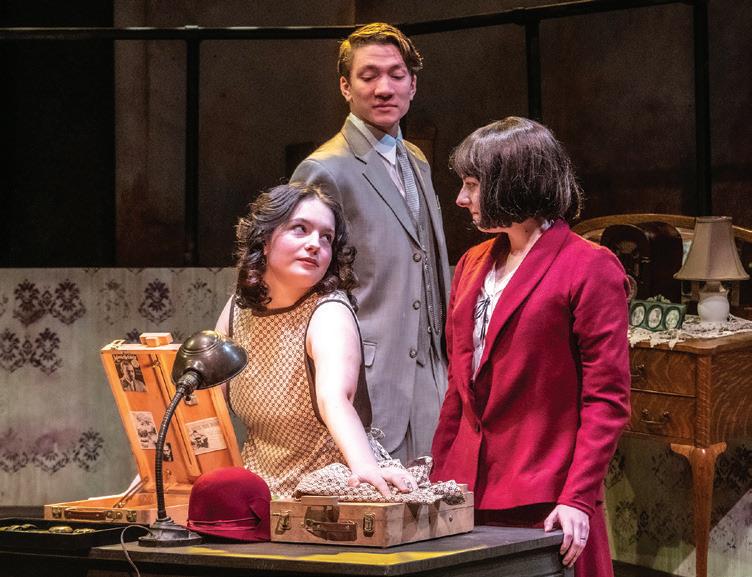
Lynch School Professor Aiding ‘Smart Playgrounds’ Project
BY PHIL GLOUDEMANS STAFF WRITER
Imagine a playground that gives young children an introduction to computer science even as they frolic and romp around.
A group of researchers including Marina Bers, the Augustus Long Professor of Education at the Lynch School of Education and Human Development, aims to create a first-of-its-kind school playground—one where slides, monkey bars, and swings can be programmed by kids through their interaction. And the Boston College Children’s Center will be one of the early proving grounds.
Funded by nearly $3 million in grants from the National Science Foundation, the “smart playgrounds” project—a collaboration between Bers, the UC Irvine (UCI) School of Education and Tufts University’s School of Engineering—will offer early learners hands-on experience with computer science and computational thinking skills that are increasingly important at all levels of education.
“In our digitally rich world, children need opportunities to become designers and producers of technologies, so they can develop computational thinking to solve problems,” said Bers. “Playgrounds are

wonderful spaces to explore concepts such as cause-and-effect and sequencing, while learning through play, socialization, and collaboration.”
The four-year effort launched in January with the first in a series of co-design sessions, where researchers learned from
Continued on page 4
Innovative Program to Mark Its First 10 Years
BY SEAN SMITH CHRONICLE EDITOR
The Boston College School of Social Work’s widely praised Latinx Leadership Initiative (LLI) will commemorate its 10th anniversary with a daylong event on March 15, “Well-Being of Latinx Communities: Social Work Response,” bringing together notable experts in social work education and practice, and other related fields.
Guest speakers will include past Massachusetts Secretary of Health and Human Services Marylou Sudders, a former BCSSW faculty member; Joy Rosen, vice president of Massachusetts General Hospital and Massachusetts General Physician Organization & Mass General Brigham, System Behavioral and Mental Health, who will give the keynote; and University of California-Berkeley School of Social Welfare Professor Kurt Organista, who will offer the closing remarks.
BCSSW Professor and LLI Founding Director Rocío Calvo and LLI Assistant Director Ximena Soto will be among the BC-affiliated speakers at the invitation-only event, which takes place in Barat House.
Calvo founded the LLI in 2013, designing a cohort-based program that has prepared almost 240 bilingual and bicultural social workers to accompany Latinx communities in developing sustainable solutions to complex problems in health, education, housing, and other areas. Students
Continued on page 5
INSIDE
2 Around Campus
2101 Commonwealth reopens; Laetare Sunday is March 10.
3 MLK Scholarship
CSON student Julie Canuto-Depina wins honor.
5 Courage to Preach
CSTM launches new certificate program.
PUBLISHED BY THE BOSTON COLLEGE OFFICE OF UNIVERSITY COMMUNICATIONS FEBRUARY 29, 2024 VOL. 31 NO. 12
The Boston College Theatre Department and Robsham Theater Arts Center launched its spring season last week with a production of Melanie Marnich’s “These Shining Lives,” directed by Milly Caballero ’24 and performed in the Bonn Studio Theater.
Latinx
photo by lee pellegrini
Leadership Initiative
photo by caitlin cunningham
Marina Bers
Around Campus
Renovation Over, 2101 Commonwealth at Boston College Reopens Its Doors
2101 Commonwealth at Boston College, one of Greater Boston’s prime event destinations, has reopened following last year’s sixmonth renovation.
Originally constructed in 1927, the grand Roman Renaissance Revival-style building is located on the University’s 65acre Brighton Campus just minutes from downtown Boston, with views of the city skyline. Among BC’s most distinctive spaces, 2101 Commonwealth is designed for elegant, exclusive celebrations including weddings, special occasions, private functions, and corporate events.
“2101 Commonwealth is destined to be a premier event location for our University,” said Associate Vice President for Auxiliary Services Patricia Bando. “There is intended synergy between the McMullen Museum of Art and Auxiliary Services Event Management for operating this beautiful gathering place to our Boston College community of faculty, staff, students, alumni, and friends.
“BC has worked on beautifying not only inside this majestic building but also the outside grounds, which serve as a lovely setting for celebrations of major campus events or wedding receptions,” she added.
The Neo-Renaissance palazzo includes an adjacent glass-enclosed space that houses the McMullen Museum, offering a combination of old-world art in a modern setting, with elegant interiors, a patio, and formal lawn which accommodate varied event needs, with on-site catering provided.
Featured as a Unique Venues “Top Pick,” the rooms showcase works of art from the McMullen Museum permanent collection, including masterpieces from the private collection of famed investor and University Trustee Peter Lynch ’65, H’95 and his late wife, Carolyn H’09, which he donated to BC. The Carolyn A. and Peter S. Lynch Collection comprises 27 paintings and three drawings from 20 renowned artists, among them Albert Bierstadt, Childe Hassam, Martin Johnson Heade, Fitz Henry Lane, Mary Cassatt, Pablo Picasso, Winslow Homer, and Jack Butler Yeats, and are displayed on the first floor.
“We are excited to share that our 2101 Commonwealth venue has reopened,” said Director of Event Management James Mastin. “It’s the perfect backdrop where elegance meets art, after a thoughtful renovation and installation” of the Lynch Col-
Fr. Berrelleza to Speak at Laetare Sunday
Boston College’s 73rd annual Laetare Sunday celebration—the BC Alumni Association’s oldest tradition—will take place on March 10 and feature an address by Erick Berrelleza, S.J., founding dean of Messina College at Boston College.
Laetare Sunday is the fourth Sunday of Lent and marks the season’s midpoint. The day will begin with Mass at 9:30 a.m. in Conte Forum, with University President William P. Leahy, S.J., presiding. A brunch will immediately follow.
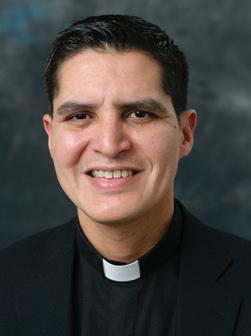
Fr. Berrelleza came to Boston College in September 2022 to lead Messina College, the new two-year residential college division of BC, which will offer an associate’s degree program beginning in the 20242025 academic year. Messina is located on the Brookline Campus of Boston College.
Formerly an assistant professor of sociology at Santa Clara University, Fr. Ber-
relleza is a first-generation college student whose scholarship has focused on urban sociology and immigration.
A Los Angeles native and a member of the USA West Province of Jesuits, he received a bachelor’s degree in philosophy from Loyola Marymount University, an M.Div. degree in theology and ministry from BC in 2015, and a doctorate in sociology from Boston University in 2021. He has served as a visiting scholar in BC’s Boisi Center for Religion and American Public Life, and as a member of the board of trustees at BC, Santa Clara University, Brophy College Preparatory School in Phoenix, and Bellarmine College Preparatory in San Jose.
For more about Laetare Sunday, including registration information, go to the Alumni Events Calendar: rb.gy/nbplvt —University Communications
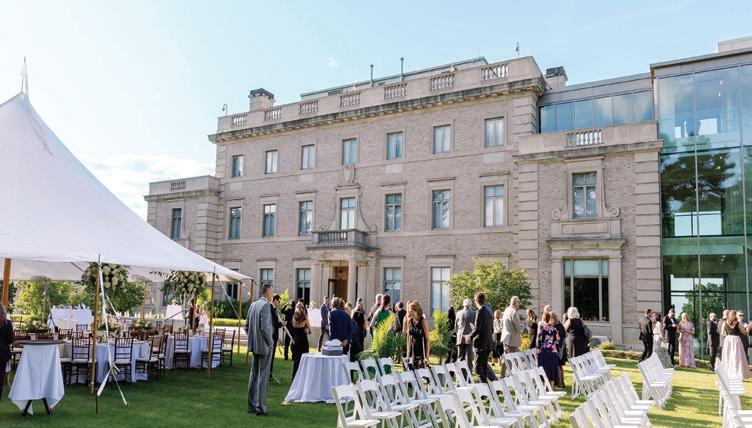
lection.
The collection “transforms the walls of this Boston College special event space into a beautiful, breathtaking gallery to view the works of fine artists,” said Bando. “This art collection is truly an added value for internal or external events at 2101 Commonwealth.”
The Hill Family Room and its adjacent gallery in The Putnam Room (rooms 111 and 109, respectively) are ideal for intimate events and can accommodate 56 guests for a seated meal with a dance floor, Mastin noted. Combined, the galleries on the first floor can accommodate up to 180 for a reception-style event. Outdoor events may be hosted on the expansive lawn from May through October, and require the use of a tent; the lawn is suited for guest counts up to 180 for a seated meal. The venue—which also has won accolades from The Knot and
Wedding Wire, and praise from many who have celebrated occasions there—provides free parking.
To celebrate the reopening of 2101 Commonwealth, exclusive pricing will be offered to Boston College faculty and staff for special events on select dates from now through December 15. For more information and to reserve a special event date, email 2101commonwealth@bc.edu or call 617-552-0311. This offer will later be extended to University alumni, as well as to the public.
“We are so happy to extend a welcome to our Boston College community and friends who are planning an event or program that needs to have a memorable ambience,” said Bando. “2101 Commonwealth is that place.”
—University Communications
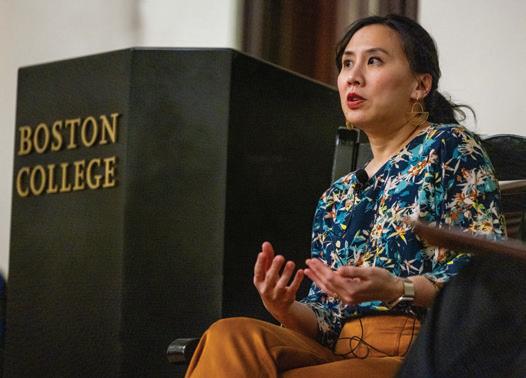
February 29, 2024
The Boston College Chronicle (USPS 009491), the internal newspaper for faculty and staff, is published biweekly from September to May by Boston College, with editorial offices at the Office of University Communications, 3 Lake Street, Brighton, MA 02135 (617)552-3350. Distributed free to faculty and staff offices and other locations on campus. Periodicals postage paid at Boston, MA and additional mailing offices. POSTMASTER: send address changes to The Boston College Chronicle, Office of University Communications, 3 Lake Street, Brighton, MA 02135. A flipbook edition of Chronicle is available via e-mail. Send requests to chronicle@bc.edu. ASSOCIATE VICE PRESIDENT FOR UNIVERSITY COMMUNICATIONS Jack Dunn SENIOR DIRECTOR FOR UNIVERSITY COMMUNICATIONS Patricia Delaney EDITOR Sean Smith CONTRIBUTING STAFF Phil Gloudemans Ed Hayward Audrey Loyack Rosanne Pellegrini Kathleen Sullivan PHOTOGRAPHERS Caitlin Cunningham Lee Pellegrini www.bc.edu/bcnews chronicle@bc.edu Chronicle
photo by melissa robotti
2101 Commonwealth at Boston College is a venue for weddings and other events.
Erick Berrelleza, S.J. photo by john gillooly
Award-winning author Celeste Ng visited campus on February 12 and spoke with Elizabeth “Biz” Bracher, director of Cornerstone Seminar Programs, as part of the Morrissey College of Arts and Sciences Cornerstone Conversations for first-year students.
Snapshot Welcome Guest
2 Chronicle
photo by caitlin cunningham
CSON Student Wins Martin Luther King Jr. Scholarship
BY KATHLEEN SULLIVAN STAFF WRITER
Connell School of Nursing student Julie Canuto-Depina, who hopes to address the social determinants of health as a nurse after graduation, has been awarded the 2024 Martin Luther King Jr. Scholarship. She received the honor from University President William P. Leahy, S.J., at the 42nd annual Martin Luther King Jr. Scholarship Banquet held on February 19.
The scholarship, which provides for up to $35,000 toward senior-year tuition, recognizes a Boston College junior who has demonstrated superior academic achievement, extracurricular leadership, community service, and involvement with the African American community and African American issues.
A nursing major from Brockton, Mass., Canuto-Depina is a mentor in CSON’s Keys to Inclusive Leadership in Nursing program.
“One of MLK’s quotes that speaks volumes to me is ‘Life’s most persistent and urgent question is what are you doing for others?’” said Canuto-Depina. “I have realized that the capacities, abilities, skills, knowledge, level of advocacy, compassion, resilience, and hope God has blessed me with are not meant for me to keep to myself but rather to use as tools to build up my brothers and sisters, to advocate for my patients and move towards a more just society.
“I want to use my knowledge and start conversations that serve my patients. Sometimes nurses get caught up in the clinical aspect of care for patients and forget about social determinants of health. Maybe a lack of transportation is interfering with a patient being able to access fresh vegetables or medication, for example. I want to see things through the lens of my patients and be their advocate.”
Canuto-Depina is a Montserrat student ambassador and served as a leader for the program’s Jamaica Magis Service Trip. She is an intern with the Thea Bowman AHANA and Intercultural Center and serves on the Options Through Education Council. She also is the co-student leader of the Black Excellence Gala.
A first-generation college student whose parents are from Cape Verde, Canuto-Depina is the secretary for the Cape Verdean Student Association.
“What I admire most about Julie is that she is always empowered by her overlapping identities: Options Through Education scholar, first-generation student, Montserrat student, Black, and woman,” wrote African and African Diaspora Studies Program Assistant Director Richard Paul. “She uses any benefits/opportunities derived from those identities to either help others directly or indirectly through awareness.”
The MLK Jr. Scholarship Banquet included a keynote speech by University of Rochester Assistant Professor Philip McHarris ’14, who received the MLK Jr. Scholarship in 2013 [see separate story about McHarris on page 6].
Other finalists for the 2024 Martin Luther King Jr. Scholarship were:
Tracy Aggrey-Ansong, Atlanta Majors: Neuroscience and Theology
Resident assistant, co-president of the Black Christian Fellowship, and a member of the African Student Organization, SACNAS, and the First Generation Club. Participated in the Dominican Republic Service and Immersion Program. QuestBridge Scholar, McNair Scholar, and Gateway Scholar. Recipient of the Unsung Hero Award by the BC Office of Residential Life. Long-term goal is to become a clinical research scientist in the field of neurology, focused on minoritized populations;

also wants to be an educator and advocate for minoritized populations in the healthcare system.
Joy Babalola, New York City
Major: Neuroscience/Minor: Medical Humanities
Dancer and creative designer for Presenting Africa to You (PATU) dance team, event coordinator for the Black Student Forum, outreach coordinator for the Black Christian Fellowship, and a resident assistant. Conducts research in Straus Family Sesquicentennial Assistant Professor of Neuroscience and Psychology Caroline Smith’s neuroscience lab. Plans to pursue research in the field of medicine, where she hopes to break down the intersectional boundaries between medicine and humanity, fostering a connection between patients and physicians.
Temidayo Lukan, Malden, Mass.
Major: Philosophy/Minor: Managing for Social Impact and the Public Good Resident assistant for Fr. Rutilio Grande Intercultural Experience Living and Learning Community. Member of the Student
Conduct Board, mentor for the Paul Robeson Institute, and project leader for Bridge the Gap. Participated in the Arrupe South Africa Immersion Trip. Undergraduate research assistant in Assistant Professor of Psychology and Neuroscience Gregg Sparkman’s Social Change and Social Influence Lab, and worked at the educational start-up Fitalyst, a platform that helps to bridge the gap for first-generation students. Plans to pursue graduate studies in educational policy to help create a more inclusive educational system.
Esther Udoakang, Boston
Major: Nursing
Vice president of the African Student Organization, Keys to Inclusive Leadership in Nursing mentor, Montserrat Student Ambassador, and member of the Black Christian Fellowship. Volunteer for the Student Admissions Program. Participated in the Arrupe Service Immersion trip to Ecuador. Winner of the Harvard Book Prize and the English Scholar Award. Plans a career in nursing, with a goal of providing equitable health care, focusing on healthcare disparities among Black people, specifically Black women.
Lynch School Professor Among 40 ‘Outstanding Women’ in Higher Ed
BY PHIL GLOUDMEANS STAFF WRITER
Ana M. Martínez-Alemán, a professor in the Lynch School of Education and Human Development, and its associate dean of faculty and academic affairs, was selected as one of 40 outstanding women in higher education by Diverse: Issues In Higher Education, the preeminent source of critical news, information, and insightful commentary on the full range of issues concerning diversity in American colleges and universities.
To coincide with its 40th anniversary, and in advance of Women’s History Month in March, Diverse is honoring 40 women “who have made a difference in the academy by tackling some of higher education’s toughest challenges, exhibiting extraordinary leadership skills, and making a positive difference in their respective communities” in its February 29 issue.
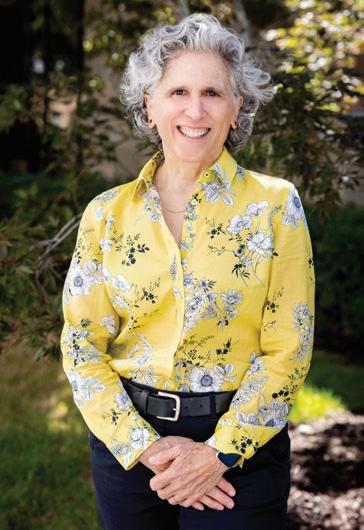
Martínez-Alemán, the Golden Eagle Foundation Faculty Research Fellow, studies topics at the forefront of higher education and campus culture. Her 2009 book, Online Social Networking on Campus: Understanding What Matters in Student Culture (with Katherine Lynk Wartman), was the first to explore social media’s impact on students. Currently, she examines online racialized aggression, and how students of color and first-generation students use technology. Her most recent book, Voices of Campus Sexual Violence Activists: #MeToo and Beyond, explores student sexual violence activism and institutional practice.
“My professional efforts have always been dedicated to enriching diverse students’ and faculty’s experiences on our campuses,” said Martínez-Alemán. “This honor is especially heartwarming, but also quite humbling. I am truly appreciative of the recognition.”
“We are excited and proud that our colleague Ana Martínez-Alemán has received this substantial honor from Diverse: Issues In Higher Education,” said Stanton E.F. Wortham, the Charles F. Donovan, S.J., Dean of the Lynch School. “The selection recognizes her scholarly contributions to the field of higher education; it also notes, and we are particularly grateful for, her many contributions to Boston College and to the profession. She has consistently offered her expertise and her time to improve higher education here at the University and beyond.”
Martínez-Alemán joined the Lynch School in 1998 and served as department chair of the Educational Leadership and Higher Education Department from 2007 to 2017. She is the immediate past president of the Association for the Study of Higher Education.
February 29, 2024
Julie Canuto-Depina accepts congratulations after being announced the winner of the 2024 Martin Luther King Jr. Scholarship.
photo by caitlin cunningham
M. Martínez-Alemán
by caitlin cunningham 3 Chronicle
Ana
photo
Graver’s Novel Kantika Continues to Win Accolades
BY ROSANNE PELLEGRINI STAFF WRITER
Professor of English Elizabeth Graver’s critically acclaimed latest novel, Kantika named by The New York Times as one of the 10 Best Historical Fiction novels and 100 Notable Books of 2023—recently was awarded additional literary accolades.
Published last year, Graver’s fifth novel was inspired by her grandmother, who was born into a Sephardic Jewish family in Istanbul and whose shape-shifting life journey took her to Spain, Cuba, and New York.
In January, the book was named the winner of the 2023 Edward Lewis Wallant Award, one of the oldest and most prestigious Jewish literary awards in the United States. Kantika also was honored last month as a National Jewish Book Award winner, with The Sephardic Culture Mimi S. Frank Award in Memory of Becky Levy.
“Kantika is both very close to home in that it’s inspired by my family history, and quite far afield in that I had to learn a huge
BC
Children’s
Continued from page 1
Latinx parents and kindergarteners at the Santa Ana Unified School District (SAUSD) in California and the Santa Ana Early Learning Initiative about their favorite games and activities at their existing play structures.
“Part of our process is trying to understand the realities and lived experiences of the families and the communities, and adjusting our ideas to complement their ‘funds of knowledge’ in a culturally sustaining way,” said UCI Professor of Education June Ahn, a co-principal investigator on the grant.
UCI Assistant Professor of Education Andres Bustamante, a co-principal investigator, said, “We’re taking computer science concepts out of the screen and reinforcing them in physical, playful, real-world spaces.”
According to Bers, the creator of the popular kids coding app ScratchJr and
Scenes
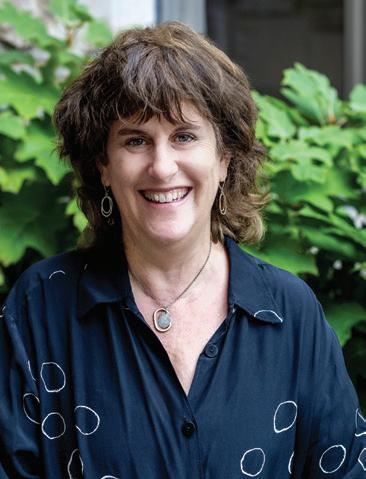
amount about far-flung places and the past,” said Graver, author of several awardwinning novels and short stories. “The
recognition it has gotten through these prizes is thrilling to me, both because I devoted years to this project and because it tells the story of a vanishing language and culture and a woman—my grandmother, Rebecca—who never had the opportunity to share her story with the world.”
The book debuted to wide critical acclaim, described as an “exquisitely imagined family saga [that] spans cultures and continents,” by The New York Times and named a best book of the year by National Public Radio (“a highly readable and poignant tale of dislocation, refuge and resilience”), Lilith Magazine, and Libby
The Wallant Award, given by the University of Hartford’s Greenberg Center for Judaic Studies, was established by Dr. and Mrs. Irving Waltman of West Hartford in 1963, and honors the memory of the late Edward Lewis Wallant, author of The Pawnbroker and other works of fiction. It is presented to a writer whose published work of fiction is deemed to have significance to American Jewish history and culture.
Inaugurated in 1950, the National Jew-
ish Book Awards is the longest-running North American awards program of its kind and is considered the most prestigious, according to the organization. The awards—which recognize authors, and encourage reading, of outstanding Englishlanguage books of Jewish interest—are made by the Jewish Book Council, founded in 1943 and the longest-running organization devoted exclusively to the support and celebration of Jewish literature.
Kantika also won an Association of Jewish Libraries Fiction Award, and was chosen for San Francisco’s Jewish Community Library’s “One Bay One Book 2023” program. This includes a series of virtual lectures organized around the themes of the book; Graver will speak in May (more at jewishcommunitylibrary.org/obob-events).
The German translation of Kantika came out on February 20; a Turkish edition is forthcoming. After the paperback edition is released on April 16, Graver will appear at events in Newton and Boston; for information on these and about Graver’s other work, see elizabethgraver.com.
Ctr. to Help Test ‘Smart Playground’
KIBO robotics, additional co-design sessions will be held with families in Boston, and early prototypes will be tested by children at the BC Children’s Center. She and Chris Rogers, the John R. Beaver Professor of Mechanical Engineering at Tufts, and one of the designers of LEGO MINDSTORMS educational sets, also serve as co-principal investigators.
Rogers will build prototypes of the programmable play structure in his Medford lab, incorporating switches, actuators, sensors, and control boards. Children will then have the opportunity to experiment with it and provide feedback before the designs are finalized and installed. The team of four researchers from the East and West coasts envisions innovative elements such as music—perhaps a moderate-tempo Latin American rhythm, or a lively mariachi tune—that matches the speed of a child descending on a slide.
By focusing on playgrounds at school sites, the researchers can work with teachers to incorporate computational thinking and play into lessons both inside and outside the classroom. While students will still have the opportunity for free play, organized activities on the play structures will be scheduled, followed up by classroom lessons that teachers will use to reinforce the learning objectives.
The project emerged from early conversations between Bers and Rogers, who have a long history of collaboration from when she was at Tufts. Then, when thinking about how to significantly impact broader communities, Bers reached out to Bustamante and Ahn, who had previously worked with Santa Ana community groups.
“This is an exciting opportunity to extend the previous work of my DevTech research group,” said Bers. “Over two
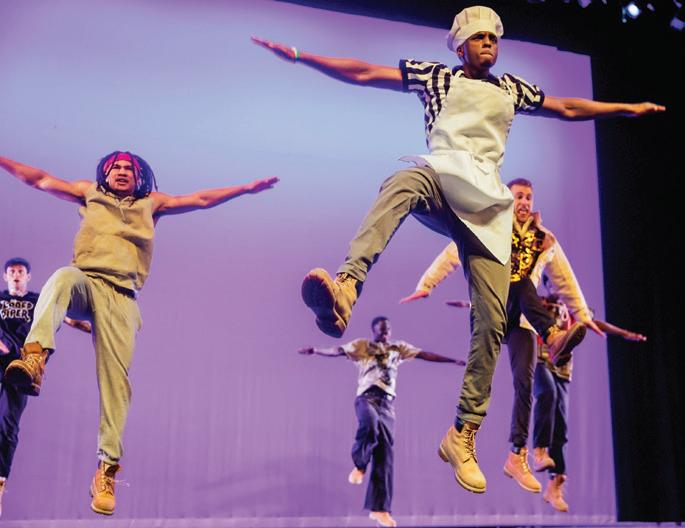
decades of work, we have learned how to create technological playgrounds with ScratchJr and KIBO robotics inside classrooms, now we want to bring our expertise outside the school.”
While the research project calls for piloting at BC Children’s Center, and then retrofitting two or three playgrounds used by over 500 kindergarteners at SAUSD schools, it may expand to other school playgrounds and community parks across the country, said Bers.
The ScratchJr application Bers and colleagues launched nearly a decade ago has made computer coding accessible to younger children, attracting more than 50 million users worldwide. Many educators and parents are eager to introduce young people to computer science, and the skills are increasingly being added to K-12 curricula.
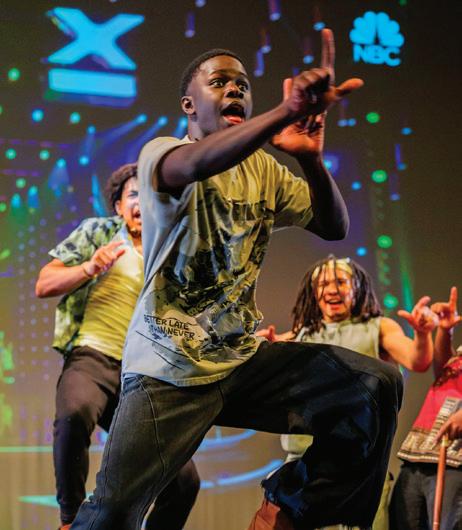
February 29, 2024
Elizabeth Graver
photo by caitlin cunningham
and
photos by tim correira
Show 4 Chronicle
BC
Boston College student step dance group Sexual Chocolate—which is marking its 25th anniversary year— presented “The Big Show: Total Chocolate Island” at Robsham Theater on February 16. The event also featured appearances by student dance troupes Fuego del Corazón, F.I.S.T.S.,
Boston College Dance Ensemble.
Big
CSTM Launches Courage to Preach Certificate Program
BY KATHLEEN SULLIVAN STAFF WRITER
A new program in the Gloria L. and Charles I. Clough School of Theology and Ministry (CSTM) will help lay and ordained ministers connect their work to contemporary issues of paramount concern to the young adults they counsel.
Courage to Preach is a six-credit postmaster’s certificate program that will provide training to help students read and interpret Scripture and use it as a foundation to preach on racial, economic, and environmental justice, and other issues. The program will offer methods for preaching and teaching diverse audiences and is especially attuned to the various opportunities, contexts, and media that can be most effective for reaching young adults.
“The CSTM is invested in helping to reach people in creative and innovative ways,” said CSTM Associate Professor Jaime Waters, program director for Courage to Preach. “This program offers ministers practical and thoughtful information, showing them how they might draw on the tradition to speak to contemporary issues, especially social justice concerns. Scripture and Catholic Social Teachings are great resources that can inspire people to be engaged in the world, and to be thoughtful about how they live.
“The program also presents an opportu-
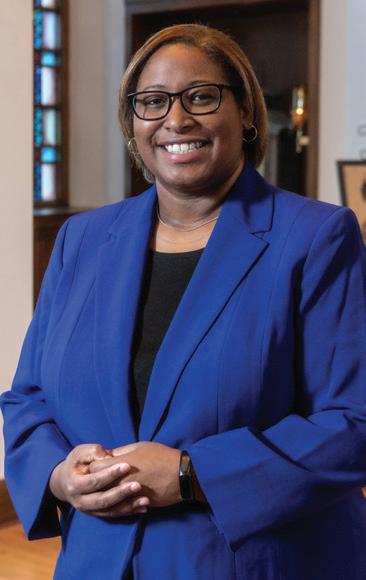
nity to explore how some concerns of today are not brand new, but are issues that people have been reflecting on and wrestling with in different ways and in different contexts,” she added.
The certificate program is intended for those who already hold a master’s degree in theology, education, or another relevant
field, and is designed to provide students with critical and creative engagement with Scripture to enhance their preaching and public speaking skills.
Waters points out that, for this program, the definition of preaching and preachers is not limited to an ordained man delivering a homily from a pulpit.
“We want our students to see themselves as preachers—people who can read and think critically and proclaim a message that speaks to and inspires people,” said Waters. Many ministers are comfortable doing reflections or counseling, she said, but for some preaching can be daunting: It may seem especially authoritative, exclusive, and to necessitate skills that not everyone feels they possess.
“We hope this new program helps participants to have the courage to preach and integrate preaching into their ministry,” she said.
The Courage to Preach program is designed for a small cohort of students to complete in a hybrid format over the course of 12 months. Participants will come to campus for two summer sessions of coursework and complete a project and online module during the academic year. The CSTM will welcome the first Courage to Preach students this July.
One of the summer courses will focus on studying, analyzing, and preaching Scripture in ways that address issues of justice. Special
attention will be given to prophetic literature, psalms, and gospels. This course will help participants hone practical and innovative skills, such as public speaking and the use of music and art to enhance preaching.
The other summer course will look at engaging diverse young adult communities in meaningful ways, such as through prayer and reflection.
During the academic year, the students will design a project or an activity, informed by and relevant to what they have learned over the summer, to be implemented at their home institution. Students also will take Preaching in Action, an online course that will explore effective preaching and communication in digital spaces.
“For this kind of program, it would be a huge miss if we didn’t talk about digital spaces,” said Waters. “We’re interested in reaching young adults, so you have to go where they are: online.”
The program will review ways that different organizations have embraced online, digital context as a way to convey messages to a wider audience. “We hope to build up students’ toolkit and digital competencies, so they can customize their messaging for their particular audience,” added Waters.
The deadline for applications for Courage to Preach is April 15. For more information on the program, or to apply, go to https://bit.ly/ cstm-courage-to-preach
A Productive Decade for Latinx Leadership Initiative
in the program take courses in Spanish, complete internships in schools, hospitals, and prisons, and conduct cutting-edge research that shapes social workers’ strategies to support Latinx clients.
The initiative has been recognized as a Model Program for Diversity Education by the Council on Social Work Education’s Center for Diversity and Social & Economic Justice, and it received a top national award from Excelencia in Education.
When she first hatched the concept of LLI, Calvo wondered if her idea would even be considered, let alone accepted: “I basically said, ‘Trust me, it will work.’”
Fortunately, BCSSW—where she earned a doctorate in 2009, joining the faculty in 2011 after a postdoc fellowship at Harvard—proved supportive.
“BC is the very embodiment of Jesuit education: student formation,” she said, citing a quote by former Jesuit Superior Hans Kolvenbach, S.J.: “The real measure of Jesuit universities lies in who our students become.”
“LLI students, many of whom are children of immigrants, relate to the mission for which BC was originally founded, to serve immigrant families,” Calvo continued. “As members of the community, LLI students and alumni become the bridge between the production of knowledge and the application of that knowledge to address issues identified by the community. So, as the birthplace of LLI, BC has had a significant impact on others.
“By teaching in Spanish, we open the
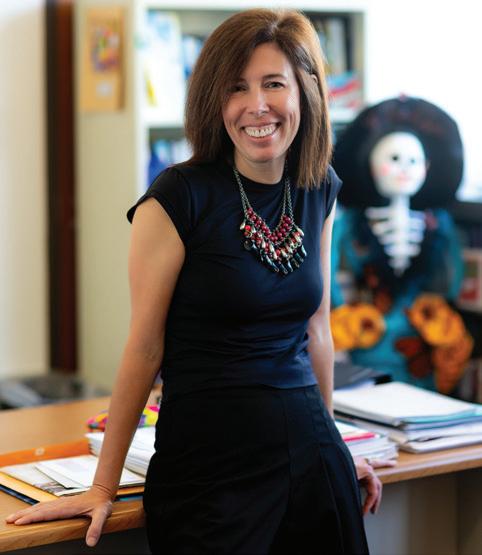
door to changing the learning space in which students interact. For students, many for the first time, this change enables them to bring their authentic selves into academic spaces that have historically denied the full expression of their lived experiences.”
Rather than hold a 10th-anniversary celebration to sing the program’s praises, BCSSW organizers saw an opportunity for assessing LLI’s strengths and challenges, along with its future paths. To give the event added impact, the school invited deans from other social work schools—including Columbia University, University
of Chicago, and University of Washington— as well as representatives from LLI’s partner organizations to discuss the health and mental health issues confronting Latinx communities in Massachusetts and nationwide; how to enable agencies to deliver culturally and linguistically congruent social work practice; and how bridging social work practice and research can address challenges facing Latinx communities.
“We thought, ‘Why not go deep? Let’s bring in our social work colleagues as well as our community partners—like the East Boston Neighborhood Health Center and the Boston Public Schools—to look at
what’s been done so far, and what we could do,’” said Calvo, crediting BCSSW Dean Gautam Yadama for suggesting the format. “I want to learn. We all want to learn. This is the way to do it.”
“A decade of Latinx Leadership Initiative indicates BCSSW’s national leadership in innovative social work practice,” said Yadama, who along with Provost and Dean of Faculties David Quigley will give a welcome at the event. “In convening prominent scholars and deans from other leading schools of social work, we look forward to paving the way toward a collective social work response to securing the well-being of Latinx communities nationwide.”
BCSSW Director of Community-Based Initiatives Yvonne Castañeda and faculty members Carolina Vélez-Grau, Kirsten Davison, Christopher Salas-Wright, and María Fernanda Piñeros-Leaño also will participate in the gathering.
Calvo—who cites LLI’s financial sustainability as an important challenge in the coming years—is gratified by the overall success of LLI, but it is the program’s smaller, everyday triumphs that mean the most to her.
“What keeps me going are the students,” she said. “To see them going to class, doing the work, discovering their strengths and abilities, and observe their transformation into caring professionals committed to improving people’s lives— that is our mission at its core.”
For more information about the Latinx Leadership Initiative, see bc.edu/lli
February 29, 2024
Before coming to BC, Rocío Calvo didn’t know if her idea for the Latinx Leadership Initiative would ever become a reality: “I basically said, ‘Trust me, it will work.’” photo by caitlin cunningham Continued from page 1
Program Director Jaime Waters
5 Chronicle
photo by lee pellegrini
Lynch School Student First Winner of Miller Scholarship
BY PHIL GLOUDEMANS STAFF WRITER
Paul McLaughlin, a Lynch School of Education and Human Development firstyear student, is the inaugural winner of the Edward D. and Patricia K. Miller Scholarship, an annual award to celebrate the good sportsmanship and Jesuit values for which “Eddie” Miller ’57, M.B.A.’68, Ph.D. ’90—a legendary figure in BC Athletics and the University—and his late son, John D. Miller ’84, were so well known.
The scholarship was established in 2022 by the Miller family—including Eddie’s wife, Patricia, the scholarship’s co-namesake—to honor Eddie’s BC legacy, as well as his hometown of Dorchester, and the family’s longtime Milton, Mass., residence. Eddie died in 2022; John died on March 20, 2023.
Milton resident McLaughlin, a 2023 graduate of Boston College High School (BCH), is an elementary education major, and plans to teach. While at BCH, he participated in a weeklong service immersion trip at the Brady Faith Center in Syracuse, NY, where he and his fellow students helped construct a house for low-income residents, assisted in farm work, and volunteered at a new supermarket in a neighborhood that was formerly a “food desert.”
He also served as a mission leader at Milton’s St. Agatha’s Parish, where he would meet with other young people to plan local service events, such as to support a lunch program for the homeless, Catholic Charities Food Pantry, clothing drives, and yard work for the elderly. He also played baseball and ran cross country for BCH.
“The Miller family is delighted to select Paul as the initial scholarship winner,” said Michelle Miller M.A.’91, Eddie’s daughter. “Paul is as an exemplary scholar athlete, and a person of great character and resil-
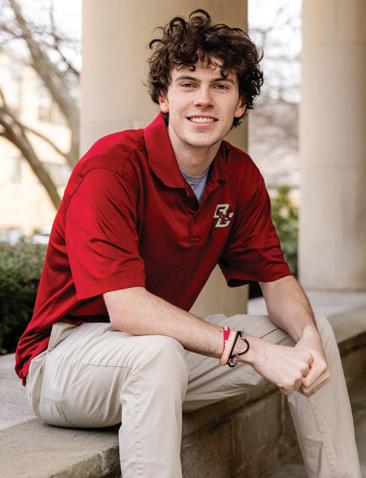
in the Korean War, he entered BC in the fall of 1953, where he made an immediate impression on the Eagles’ baseball team as a good-hitting left fielder with exemplary defensive skills. Stricken by polio in July 1955, Miller spent the next 10 months in the Boston Veterans’ Hospital, keeping pace with his BC course work by listening to reel-to-reel tapes of his classes until he could return to campus the following May.
With his athletic career over, but his unbridled optimism and fierce determination fully intact, he was elected president of his senior class and spearheaded the student fundraising effort to build Alumni Stadium. During the campaign, he met BC Athletic Director William Flynn ’39, who offered Miller the position of athletics business manager. Three years later, he was promoted to BC’s sports information
Sports Information Director Award from the All-American Football Foundation, and the Press Box Award from the New England Writers.
Eddie Miller Jr. ’81 said such honors, while gratifying, did not totally define his father’s life: “It was his undeniable charisma, his irrepressible spirit, his courage and determination, his boundless love for Boston College and the Society of Jesus and, above all, his unconditional love for and devotion to his family.”
ience. He has a deep reverence for Jesuit values and strives to be a man for others, just as John and Eddie were. The Miller family is committed to carrying on the legacies of both men, and we look forward to Paul’s certain success as an educator, and as an Eagle.”
“Paul is one of the nicest young men I have worked with in my 22 years at BC High,” said Judith C. Fargo, a BCH college counselor. “He is kind, caring, faithful and generous; he is truly a man for others. If he stays with his plan to become an elementary school teacher, there will be generations children who will be blessed to have him as their teacher and role model.”
Eddie Miller graduated from Boston’s English High School, where he starred in baseball, hockey, and football. After serving
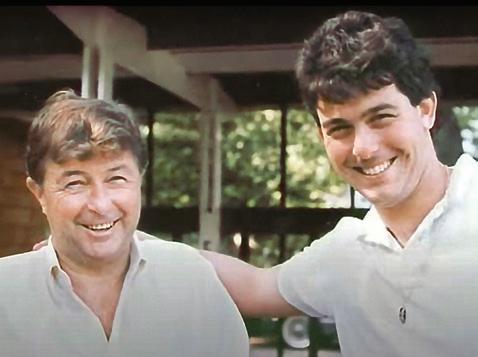
director, and came to be considered one of the country’s top SIDs. He later served as the University spokesperson, spending his entire career at BC until his retirement in 1996.
Miller’s numerous awards and acknowledgements included induction into the BC Varsity Club Athletic Hall of Fame, the Park League Hall of Fame, as well as the
John, an alumnus of BCH as well as BC, had a long and fulfilling career in commercial real estate as senior vice president of Lincoln Property Company, one of the nation’s largest diversified real estate services companies. His father’s long association with Boston College inspired him to support BC athletics from a young age—a passion he shared with his three children, all of whom are BC graduates. He loved the City of Boston, all Boston sports teams, and summers at his home on Martha’s Vineyard, according to family members.
“It has meant the world to me to connect with the Miller family, and it’s an honor to represent the legacy, spirit, passion, and love that Eddie Miller brought to the Heights,” said McLaughlin, who was presented with the scholarship last fall. “His example of overcoming adversity, and his legendary dedication to his community inspires me day in and day out as I walk through the BC campus. I truly appreciate the Miller family’s generosity more than words can convey.”
For more information on Eddie Miller’s legacy at BC, go to www.edmpkmscholars.org
NFL Veteran Bill O’Brien Is Named BC Head Football Coach
Bill O’Brien, a veteran of both the college and professional football coaching ranks, was named as the Gregory P. Barber ’69 and Family Head Coach of the Boston College football program, announced William V. Campbell Director of Athletics Blake James.
O’Brien, who served as offensive coordinator for the New England Patriots during the 2023 season, was formally introduced by James as BC’s new head coach at a February 15 press conference held in the Yawkey Center.
“I am thrilled and honored to be the head football coach at Boston College,” said O’Brien, who had recently been named as offensive coordinator for the Ohio State football program. “I’m extremely grateful for this opportunity, and I’m very proud to be the leader of a program with such a rich history and tradition.”
O’Brien said he had formed a very favorable impression of BC football after having met with the team during the previous week. “This is a ‘morning’ program. These are young men who get up at 5:30
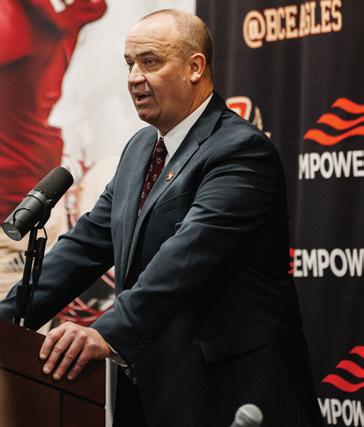
job.
“This is a place where young men can come and play good football, get a good education, and give back to the community. I think that’s what Boston College is all about. This is an outstanding group of young men who will proudly represent Boston College both on and off the field.”
every morning and they work out with us, meet on football—that’s how they practice in the spring, that’s how they practice in the fall. And then they go to class. That’s one of the main reasons why I wanted the
A native of Dorchester, Mass., O’Brien has pursued a coaching career that spans more than three decades. His resumé includes a two-year stint as head coach at Penn State, which months after his hiring was hit by severe sanctions by the NCAA over a child sexual abuse scandal that had taken place well before O’Brien’s arrival. Despite this, O’Brien led Penn State to an 8-4 record in 2012, far surpassing most expectations. He earned honors as Big Ten Coach of the Year, and won two national honors: Paul “Bear” Bryant National Coach of the Year and the George Munger Award for Coach of the Year.
Another career highlight for O’Brien was his first six seasons with the Patriots, beginning in 2007 when he was hired as an offensive assistant. The following year,
he was promoted to quarterbacks coach and offensive play-caller, and in 2011 became the team’s offensive coordinator. The Patriots’ offense had some of its most productive seasons during O’Brien’s initial tenure, which included two Super Bowl appearances.
He was named the head coach of the NFL’s Houston Texans in 2014, leading the franchise to a 52-48 record, four AFC South Division titles, and four playoff appearances—including two Wild Card round wins—between 2014 and 2020. O’Brien then spent two seasons as quarterbacks coach and offensive coordinator at national college football powerhouse Alabama before returning to the Patriots last year.
O’Brien also held coaching positions at Brown, Georgia Tech, Maryland, and Duke. He played football at Brown, where he earned a degree in political science and organizational behavioral management.
He and his wife, Colleen—a 1992 BC alumna—have two sons, Michael and Jack. —University Communications
February 29, 2024
Bill O’ Brien speaks at his introductory press conference on February 15.
photo by bc football
Above, Lynch School of Education and Human Development student Paul McLaughlin.
Right, Edward “Eddie” Miller ’57, M.B.A.’68, Ph.D. ’90 and his son John ’84.
mclaughlin photo by caitlin cunningham
6 Chronicle
Q&A For McHarris, BC ‘Felt Like the Right Place’
Philip McHarris ’14, the 2013 Martin Luther King Jr. Scholarship recipient, returned to Boston College on February 19 as the keynote speaker for this year’s MLK Scholarship Banquet [see story on page 3]. A faculty member in the University of Rochester Department of Black Studies and Frederick Douglass Institute, McHarris pursues research on racial inequality, housing, and policing; he is the author of a forthcoming book, Beyond Policing, which explores community safety and building strong, accountable communities beyond the criminal legal system. Prior to the event, he shared some thoughts with Chronicle about his BC experience and what winning the scholarship meant to him.
What interested you in attending BC?
My interest in Boston College was sparked by the promise of a rigorous education and an environment where I felt I could thrive both academically and personally. When I visited BC, it immediately felt like the right place for me—like a community where I could be challenged, grow, and contribute. The programs BC offered, such as the College Transition Program (CTP), indicated a supportive structure that would not only prepare me for the challenges of higher education but also set me on a path to achieve my career aspirations.
You participated in the Ronald E. McNair Postbaccalaureate Achievement Program as well as the CTP while at BC. From your perspective today, what impact did these programs have on you?
Their impact on me was profound and multifaceted. CTP provided me with a foundational understanding of what academic life at BC would entail, boosting my confidence and helping me forge lasting social connections even before my first semester began. This early introduction to the college environment was invaluable. The McNair Program played a pivotal role in my academic and professional development, offering resources, support for graduate school applications, and a global perspective through study abroad opportunities. These programs were instrumental in my successful transition to a Ph.D. program and have continued to influence my career trajectory.
Who were some of the people who made your years at BC memorable?
My years at BC were enriched by numerous individuals who left a lasting impression on me. Connections with esteemed faculty and staff members such as C. Shawn McGuffey, Kalpana Seshadri, Karl Bell, Dan Bunch, Rossanna Contreras-Godfrey, and the supportive communities within the Sociology Department, African and African Diaspora Studies, Learning to Learn Office, and Bowman AHANA and Intercultural Center were pivotal. Each person, department, and program contributed uniquely to my academic and personal growth, providing
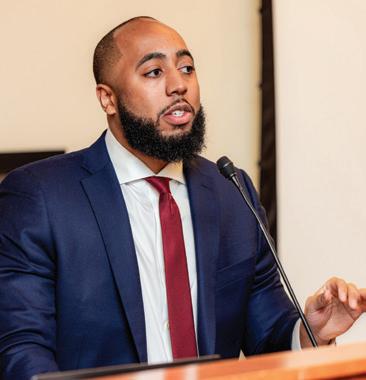
OBITUARY
Sanford Katz, BC Law Professor
A funeral service was held February 15 in Temple Shalom of Newton, Mass., for retired Boston College Law School Professor Sanford Katz, who died on February 10. He was 90.
guidance, encouragement, and a sense of belonging.
You were studying abroad during the semester you were selected for the Martin Luther King Jr. Scholarship, which must’ve made it all the more memorable. How do you look back at this achievement now? What significance did it have?
The circumstances surrounding the receipt of the award were anything but usual—receiving it in South Africa, in the middle of the night via a Skype call, added an extraordinary layer to the experience. This unconventional scenario made the moment even more memorable for me.
Receiving the MLK Jr. Memorial Scholarship stands as a monumental achievement in my life, embodying the collective support and belief of the BC community in my potential.
Reflecting back, it holds a significant place in my heart, symbolizing not just a personal achievement but also the collective support and belief of the BC community in my potential. It was a milestone that underscored the importance of perseverance, passion for social justice, and the impact of scholarship support in realizing academic and career goals.
Then, a scholarship award recipient; now, keynote speaker for the same event. How does it feel to be coming back to BC?
Returning to the Heights as a featured speaker, a decade after graduating, feels surreal and incredibly rewarding. It’s a fullcircle moment that brings into focus the vision I had for my future and the realization of those dreams through hard work, support, and opportunities BC provided. This return not only allows me to reflect on my journey but the potential to share insights and experiences that might inspire current and future students. It’s a testament to the enduring impact of BC’s community and the transformative power of education.
I am immensely grateful for the foundation BC provided, which prepared me for the challenges and opportunities of academia and beyond. The journey from then to now has been enriched by the people I’ve met, the lessons learned, and the experiences shared. I look forward to continuing to engage with the BC community and contribute to its legacy of excellence and service.
—Audrey Loyack
Professor Katz joined the BC Law faculty in 1968 and become the inaugural holder of the school’s Darald and Juliet Libby Chair. An expert in family law and contracts, he was the chief drafter of model child welfare legislation for the federal government, among many other accomplishments. He served as chairman of the Family Law Section of the American Bar Association, president of the International Society of Family Law, editor-in chief of the Family Law Quarterly, was a member of various editorial boards of journals, and author of numerous foundational articles and books.
In recognition of his prolific and most distinguished scholarship, Professor Katz was invited as a Fellow at All Souls College at the University of Oxford. In 2016, 19 eminent scholars from Great Britain and the United States published a volume of legal essays in his honor.
A native of Holyoke, Mass., Professor Katz graduated from Boston University and the University of Chicago Law School, then joined the Air Force Judge Advocate General Division and served at the Pentagon. After a fellowship at Yale Law School, he began his teaching career at Catholic
Jobs
The following are among the recent positions posted by the Department of Human Resources. For more information on employment opportunities at Boston College, see www.bc.edu/jobs or scan the QR code at right.
Director, Formacion Continua
Program Director, Ever to Excel Service Center Representative
Senior Unix Systems Administrator
Information Systems Manager, Sponsored Programs
Theater Promotions & Operations Assistant
Network Systems Engineer
Food Service Worker
Grant Administration Specialist
Assistant Director, Finance and Operations
Public Safety Dispatcher
Regional Director, Major Giving (Northeast)
Academic Support Assistant
Associate Dean for Academic Affairs
Utility Worker
Program Manager, Global Education
Assistant Director, Engineering Instructional Labs
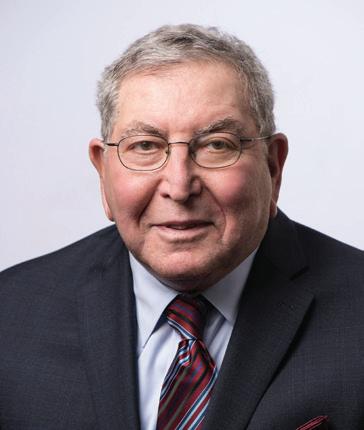
University Law School and then the University of Florida. He retired from BC Law in 2015.
He is survived by his wife Joan; sons Daniel and Andrew; grandchildren Lucia and Salvador Katz; and sister Eleanor Shrier and several extended family members. Donations in his memory may be made to Boston College Law School.
For more about Professor Katz, including testimonials and anecdotes from former colleagues and students, see lawmagazine. bc.edu/2024/02/losing-a-legend.
—University Communications

Construction Project Manager Manager of Data Integration Services Patrol Officer
Second Cook
Associate Director, Student Financial Systems
Staff Accountant / Sr. Staff Accountant
Senior Employee Relations Officer
Consulting Dietician, Pediatrics
Concessions Stand Manager
Academic Support Assistant
Research Data Consultant
Senior Business Systems Analyst
Assistant Director, Residential Life
Postdoctoral Research Fellow (multiple positions)
February 29, 2024
Sanford Katz
Philip McHarris ’14 speaking at last week’s Martin Luther King Jr. Scholarship Banquet. He won the MLK scholarship in 2013.
7 Chronicle
photo by caitlin cunningham
What Can We Learn from Teachers Strikes?
and it felt to the union, as I understand it, that good-faith bargaining was essentially abandoned in part because the school committee was buoyed by the legal preclusion to striking.
Hartney: I think three things really stood out that brought so much attention to this particular strike: the geography, the timing, and the politics. Newton is atypical of the sort of place that we see teacher strikes. This isn’t Los Angeles, it’s not Chicago, where strikes are more commonplace, where the unions tend to be routinely engaged, or at least threatening to engage in this sort of labor action.
The timing, though, really looms large here. As we heard, this was a much longer strike than what we typically see in the United States. Students were out of school as a result of the strike for about half the month, and more importantly, the strike came on the heels of COVID.
Q: Massachusetts is one of 37 states that bans teacher strikes. As a result, the Newton Teachers Association owes up to $625,000 in court-issued fines. Yet the NTA also made some significant gains from the strike settlement, including a cost-of-living increase and extended parental leave—advances which might have been achieved earlier through more productive negotiations. Do Massachusetts and other states need to consider alternatives to the strike ban?
Proctor: The short answer for me is yes. Six strikes in the span of less than two years says something about a law that’s not functioning as intended. And when you read reports of the judge who was hearing the cases of the NTA and the school committee, he remarked as to being perplexed—“I don’t quite understand why these fines being levied at such high levels are not having their intended effect”—and in response lowered the daily fines being levied on the union.
I think in part the union’s contention was that those fines were serving as a disincentive for bargaining in good faith with the school committee, that they were just waiting for the union to break, go back to school, and resume the same kind of negotiations that had been ongoing for the 16 months prior. When you have this many strikes, and this is all coming on the heels of the pandemic, that doesn’t negate the fact that this law does not appear to be functioning as intended.
Hartney: On the one hand, strike bans often fail to stop strikes. I remember a few years ago, during the West Virginia strikes, a reporter from The New Republic asked a teacher, “You know this strike is illegal, why are you doing it?” The teacher’s response was really telling to me, and I think this is true more broadly of the calculus that teachers often make in these situations: “Look, we know what the law is, but we’ve got the majority. What are you going to do? You’ve got 700 vacancies in West Virginia; to heck with the law, replace us if you can.”
On the other hand, I’m skittish about the idea of legalizing strikes. A former chair
of economics at Cornell University did a study looking at the long-run outcomes for kids when they become adults, if they were exposed to long strikes in their primary and secondary schooling years. Being out of school can have negative effects even into adult earnings. I think we all want to figure out a way to change the law. I’m not a labor lawyer, so I’m not sure what the right approach would be. But we want to limit these strikes. We want to make sure kids are in school as much as possible.
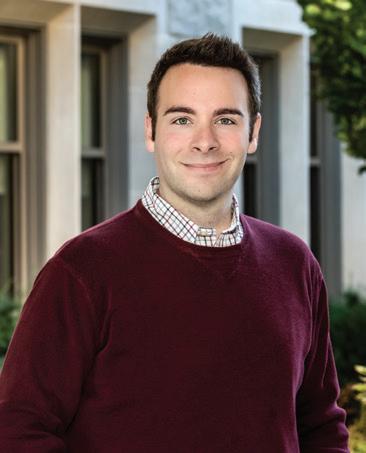
the children were affected, and like Dr. Hartney said, we don’t want kids out of school for that amount of time, particularly on the heels of a pandemic that had interrupted schooling in a way that we’ve never seen before.
Hartney: I think it depends: Are we talking about counties in Oklahoma that cut instructions such that kids were only going to school four days a week because politicians wanted to keep cutting taxes and underfund education? In cases like that,
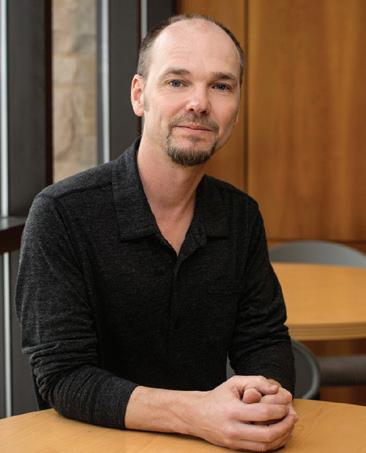
most highly effective educators, year in and year out.
Q: Teachers strikes often pit the old versus the young. Older residents without children, no longer in the school systems, frequently oppose property tax hikes to fund education, while younger teachers can’t afford to live near the schools where they teach. Data show younger educators are more supportive of unions than their older colleagues and more willing to take the risk of a strike, potentially alienating more experienced faculty in their own schools. Are there ways to bridge these age gaps in communities and schools?
Proctor: We need to rethink how we cast public education in this country, to understand that public education is a cornerstone of a functional democracy. It is the only place where anyone can go and attend school and get an education. I don’t want to overstate it, but other than public libraries it is the most accessible institution that we have in this country, and the degree to which it gets vilified, I think, pits older versus younger. If there was more of a consensus on the value of public education, we might be able to make some progress, but that’s a societal effort.
Q: Strike critics claim teachers have misplaced their priorities by putting themselves ahead of the students. Teachers say strikes are driven by the need to provide better services and resources for their students. Are the critics correct, or are the gains won by teachers improving both their students’ learning environment and their economic teaching conditions?
Proctor: I think both sides put kids in the middle of this debate. I don’t think it’s one-sided that the Newton teachers saying they’re fighting for the children and the school committee is saying that the teachers are keeping the children out and the big losers here are the children. So, it’s kind of a hard question to answer. I do think
BC Scenes Core Discussion
educators taking to the picket lines as a last resort may be an important thing. I’m not so sure that’s the case when we look at districts where spending has increased even after inflation, especially when enrollment is down. There’s a major problem because districts are going to have to figure out how to right-size their teaching force relative to students, especially in the aftermath of the pandemic.
Unions can play an important role in holding spendthrift politicians’ feet to the fire. But we also need to recognize that unions will tend to advocate for their members’ occupational interests, irrespective of whether those interests always and perfectly align with what’s best for kids. It’s in having the best instruction possible, the
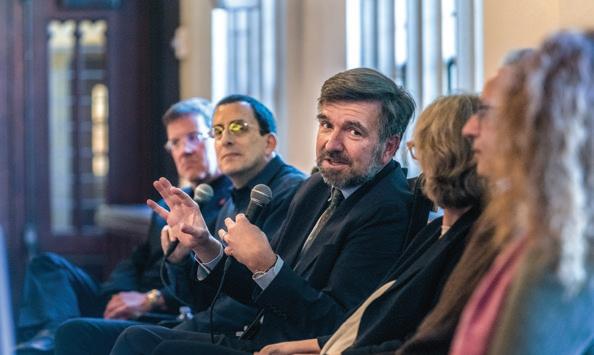
Hartney: If you look at strikes that have taken place recently, you see a lot of language from union leaders about bargaining for the common good. On the one hand, union advocates see this positively. They say the teachers unions are not just bargaining for a higher cost-of-living adjustment, they’re asking for things that their members and the community would be better off with in their estimation. I’m not focusing here specifically on the Newton Teachers Association, but I am a little worried because unions are not making compelling political arguments when they say to the district, “You need to figure out affordable housing. You need to have it so that our members can afford to live close to school.”
I don’t think it’s necessarily fair to school districts that don’t have the political authority to change that dynamic compared to, say, state governments to hold their feet to the fire and say “Our willingness to work hinges on you.”
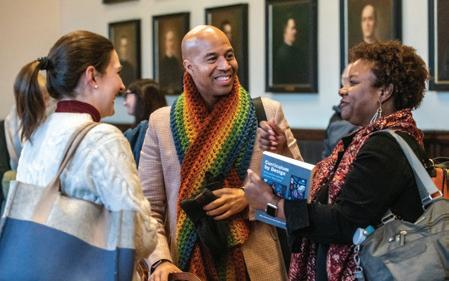
February 29, 2024
Continued
from page 1
Michael Hartney “Unions are not making compelling political arguments when they say to the district, ‘You need to figure out affordable housing. You need to have it so that our members can afford to live close to school.’”
C. Patrick Proctor: “If there was more of a consensus on the value of public education, we might be able to make some progress, but that’s a societal effort.”
photos by lee pellegrini and christopher soldt
(Left) Provost and Dean of Faculties David Quigley spoke during a February 20 panel discussion in Gasson 100 on the University Core Curriculum. (Above, L-R) Faculty members Anna Wittstruck, C. Shawn McGuffey, and Lorelle Semley were among those attending the event, held in advance of the core’s 10th anniversary.
8 Chronicle
photos by lee pellegrini






















